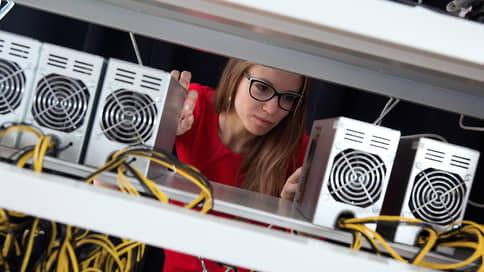Demand for cryptocurrency mining capacity is growing rapidly in Russia
[ad_1]

Against the background of the rapid weakening of the ruble, data center operators specializing in cryptocurrency mining are seeing an increase in demand for their services. A weak ruble allows you to save on costs against the backdrop of a stable bitcoin rate. In addition, experts note the relocation of Chinese miners from the United States to Russia against the backdrop of tightening the requirements of the authorities. However, many risks remain in the industry, analysts warn, primarily related to the lack of “clear regulation”.
In Russia, the demand for the placement of facilities for mining cryptocurrencies is rapidly growing, showed a survey of Kommersant of data center operators specializing in such services.
BitRiver (more than 350 MW of capacity) said that the volume of orders doubled in the first half of the year compared to the second half of 2022. BitCluster (60 MW capacity) “receives requests every day” for the placement of wholesale lots of equipment for 10, 20, 30 MW. “The market simply does not have time to allocate capacity and build new data centers to meet demand. Large customers have to wait for months, ”says the company.
Growth in demand was also confirmed by BWC UG (more than 100 MW of capacity): “Up to 10–15% of new customers agree to sovereign risk and are considering the possibility of supplying equipment to the Russian Federation.” In the current market, it is possible to grow many times, “but there is nowhere – there are no available capacities,” the company added.
According to BitRiver, the total volume of industrial mining in the Russian Federation at the beginning of the year was 1.2 GW (see Kommersant on April 7), its growth potential by the end of the year against the backdrop of active demand could reach 1.7 GW. The company believes that by the end of the third quarter, the excess of demand over supply may reach 70-100 MW. 51ASIC co-founder Mikhail Brezhnev estimates the volume of Russian mining at 10% of the global computing power (more than 40 EH / s, exahashes per second). This amount of computing allows Russian miners to mine about 100 BTC daily, he added.
Experts interviewed by Kommersant attribute the growth in demand for the placement of mining equipment primarily to the weakening of the ruble. Only since the beginning of August, the dollar has grown by 10%, since the beginning of the year – by almost 40%. In the morning of August 14, the exchange rate of the dollar exceeded 101 rub. The weakening of the ruble helps to save on costs – salaries to employees are paid in rubles, electricity bills do not grow as fast as the dollar, explains Roman Nekrasov, co-founder of the ENCRY Foundation.
This gives the Russian Federation a significant advantage over other countries. The average cost of bitcoin mining in Russia was about $15,000 a year ago, and now, due to the depreciation of the Russian currency, it has dropped to $10-12,000. At the same time, bitcoin quotes have been stable in recent months, according to CoinMarketCap, and are at the level of $30,000.
Another reason for the growing demand, according to experts interviewed by Kommersant, is the flow of Chinese miners from the United States. BitRiver Deputy CEO for Finance and Investment Alexander Volkov attributes this to a combination of factors such as rising electricity prices, rising interest rates on loans, regulatory pressure from the US authorities on the cryptocurrency industry, including the mining industry as a whole, and worsening political relations with China.
So, in March, the US Treasury proposed to introduce an excise tax on enterprises in the amount of 30% of the cost of electricity used to mine digital assets. Rates on the American market almost doubled over the year, in particular, the base rate rose from 3.25% to 5.5%.
However, in Russia, mining also still carries a number of risks, the main of which is the lack of clear regulation, Kommersant’s interlocutors say. If the Russian authorities demand that all cryptocurrency mined at Russian enterprises be sold on some centralized exchange, it will immediately be labeled as toxic, and AML systems (anti-money laundering) of large trading platforms may refuse to accept, Mr. Nekrasov noted. There are also risks in the supply of high-tech equipment.
Nevertheless, Valery Petrov, a member of the RAKIB expert council, believes that “with the current exchange rate of the ruble and electricity prices, the demand for business expansion from data centers will be stable.”
[ad_2]
Source link





